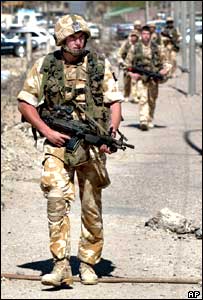|
The UK's armed forces are deployed across the world in a range of roles. Use the map and detailed information below to find out how many are where, and why.

|
OPERATIONAL Afghanistan: 7,800
Balkans: 850
Iraq: 4,000
MoD figures as of 29/04/08
|
 |
NON-OPERATIONAL Cyprus: 3,300
Falkland Islands: 1,300
Gibraltar: 300
Germany: 21,500
Northern Ireland: 1,500
Other including UN: 330
|
According to the MoD, operational deployments are those announced by the defence secretary in parliament involving commitment to a specific theatre. Non-operational deployments do not involve a fighting role.
|
IRAQ

Iraq is the army's highest profile but not biggest deployment abroad
|
By far the most high profile UK commitment overseas is Operation Telic - the name given to the deployment of personnel to Iraq.
In plans announced by the prime minister in October 2007, troop numbers were set to be reduced to 2,500 from the spring of 2008. However, on 1 April 2008 Defence Secretary Des Browne announced delays due to an increase in violence in Basra. He said the situation would be under review.
Since the end of the war in April 2003, troops have been helping to restore essential infrastructure and services and provide security.
UK forces are based near Basra Airport in the south of the country.
Some 1,600 troops were withdrawn in 2007 after the completion of Operation Sinbad, which was designed to put Iraqis in charge of Basra's security.
AFGHANISTAN
The UK has almost 8,000 troops stationed in Afghanistan as part of what Prime Minister Gordon Brown has said is a "long-term commitment" in the country.
Most of them are stationed in the volatile southern province of Helmand, where UK forces have been fighting the Taleban.
Their presence is part of a Nato deployment aimed at helping the Afghanistan government maintain security and rebuild the country's infrastructure, following the US-led invasion of October 2001.
Nato's International Security Assistance Force (Isaf) mission currently totals about 36,000 troops.
BALKANS
The UK military presence in the Balkans has been significantly scaled back from the peace-keeping and stability roles undertaken in the aftermath of the conflicts of the 1990s.
Now the UK's biggest regional deployment by far is in Kosovo as part of a Nato operation aimed at maintaining public order in the newly independent country, where tensions remain between the majority ethnic Albanians and the Serb minority.
NORTHERN IRELAND

There is still a sizeable army presence in Northern Ireland
|
The operational mission of the UK armed forces in Northern Ireland ended in July 2007.
The forces had been actively involved in supporting the police "in the defeat of terrorism and the maintenance of public order".
Some 1,500 troops remain on garrison duty - living and training as they would in any other part of the UK.
GERMANY
Although much smaller than its deployment in Germany at the height of the Cold War, the more than 20,000 UK troops there represent the largest overseas contingent by far.
Germany provides an important base for training, although many of the troops based there have been deployed to Iraq, and others are involved in the Allied Rapid Reaction Corps, of which Britain is the lead nation.
CYPRUS
Although Cyprus has been an independent republic since the 1960s, Britain retains two areas of sovereign territory on the island which it uses as bases for more than 3,000 troops.
Covering 98 square miles (158 square km), the bases are used to give the UK a foothold at a strategic point in the Mediterranean.
In particular, the MoD describes RAF Akrotiri as "an important staging post for military aircraft".
FALKLAND ISLANDS
More than 20 years after the end of the Falklands War, but with the status of the British Overseas Territory still disputed by Argentina, a strong military presence remains on the islands, with more than 1,000 troops stationed there.
Their tasks include road building and mine clearance from the 1982 conflict.
GIBRALTAR
Considered an important base in the Mediterranean, Gibraltar is home to more than 500 British troops.
The MoD says the Rock is "well situated to observe shipping channels through the straits and it could dominate the western entrance to the Mediterranean in time of war".
ASCENSION ISLAND
In the middle of the Atlantic Ocean, far-flung Ascension Island was used as a staging post during the Falklands War - a role it retains.
The 40 or so British troops there are linked to the UK by regular flights to RAF Brize Norton and a six-weekly cargo ship from the MoD.
DIEGO GARCIA
The British territory of Diego Garcia, in the Chagos archipelago in the Indian Ocean, has been a military base since the island was leased to the US in the 1970s.
Fewer than 50 British personnel are stationed at the base at any one time.
OTHER, INCLUDING UN MISSIONS
More than 300 British military personnel are deployed in smaller numbers to a wide range of other locations around the world.
UN operations include Sierra Leone, Cyprus, Liberia, Ethiopia and Georgia.
Forces are often sent to short term deployments in emergency situations, such as the 2004 Asian tsunami, when British forces were involved in providing relief including delivering supplies and helping with rebuilding work.
Other overseas deployments include training, exchanges and "loans" to armed forces in countries like Belize, Brunei, Canada, Kenya, Kuwait, Oman and Saudi Arabia.
|
Bookmark with:
What are these?